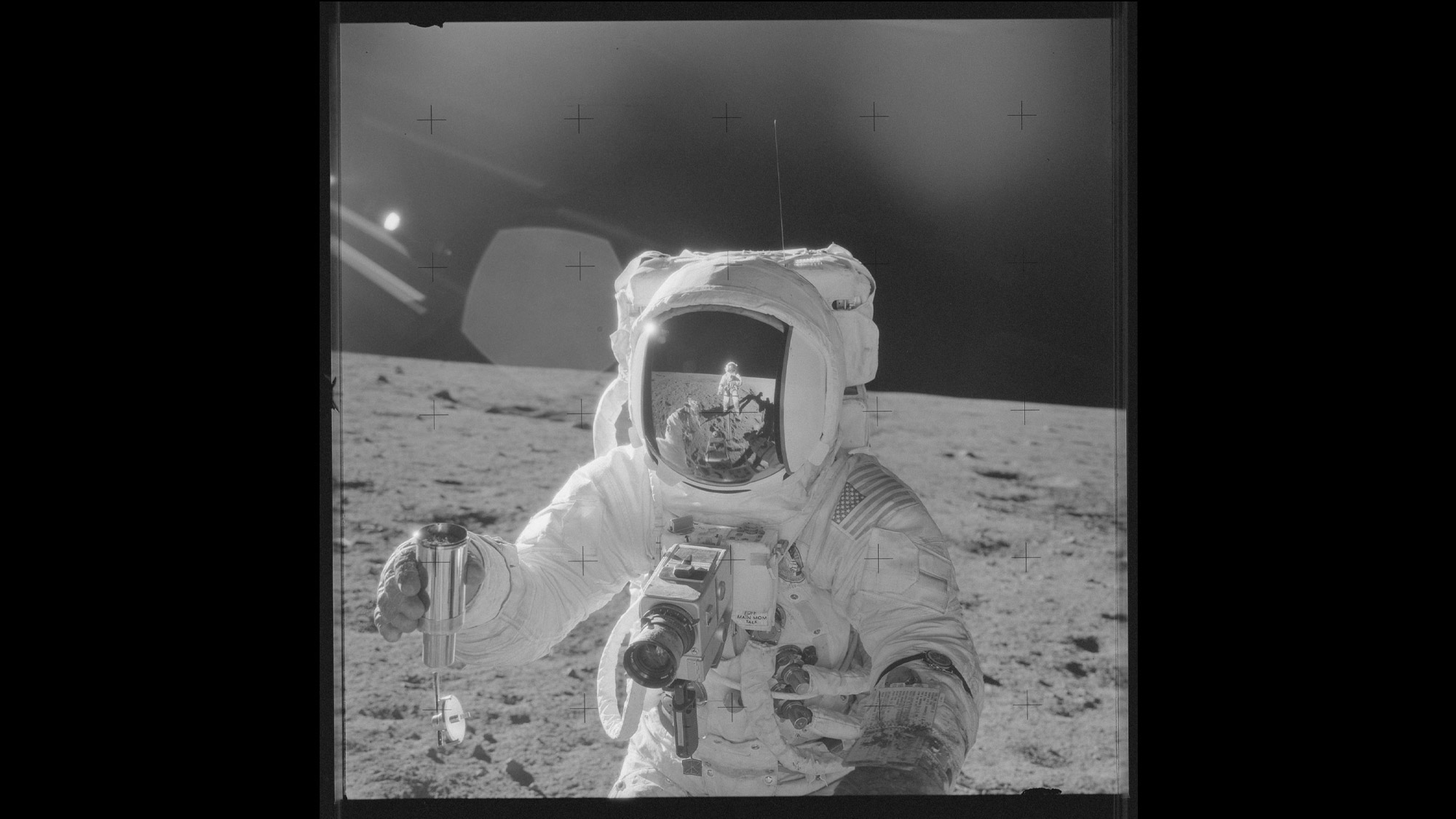
Just over 50 years ago, NASA achieved a monumental accomplishment by landing humans on the surface of the moon. Americans celebrated the anniversary of this triumph, representing the country's victory in the Cold War space race, with great fanfare in July.
And yet, what if this great achievement had never happened? What could cause such an outcome, and what would it be like to live in an alternate history in which humans never landed on the moon?
Historians are not always fond of hypotheticals, especially ones for which they have no data. So, when Live Science presented this speculative subject to former chief NASA historian Roger Launius, he had a lot of initial questions.
Related: How Much Trash Is on the Moon?
"Does that mean nobody declared a moon race in the first place?" Launius asked. "Or there was a moon race, but the Americans called it off? Or does it mean the Americans undertook it but we lost to the Russians?"
Taking the possibilities one at a time, Launius first sketched out a potential history in which the moon race never happened. The Cold War competition was certainly important, he said, with both the U.S. and the Soviet Union seeking to demonstrate their superiority in science and technology.
But had Dwight Eisenhower been in the White House in the early 1960s, it seems likely that his response to the Soviets' successful launch of Yuri Gagarin, the first person in space, would have been different than President John F. Kennedy's, Launius said.
Sign up for the Live Science daily newsletter now
Get the world’s most fascinating discoveries delivered straight to your inbox.
Eisenhower certainly supported NASA, which was created during his administration in 1958. "But he spent all of the 1960s moaning about NASA wasting all this time, and saying that we needed to do something else," Launius said. "I think there's no reason to believe his response would have been, 'Let's go to the moon.'"
Eisenhower, Launius speculated, might have instead spent the enormous sums of money that the Apollo program ate up elsewhere, likely on beefing up the United States' military strength, which for Eisenhower was largely what the Cold War was about. And as a result, perhaps the country's moon aspirations would have languished.
Plan terminated
What about the second possibility — what if the U.S. started the Apollo program but then called it off partway through?
There is some evidence that such a scenario was likely, Launius said. Public opinion polls conducted throughout the 1960s asked people which country they thought was ahead in the space race: the U.S. or the Soviet Union. For most of the early decade, people said the Soviets were winning.
"But it flips in 1965," Launius said, right around the time the Gemini program began flying astronauts into orbit. "At the point it changes, I can see a president saying, 'We don't have to do this on an accelerated schedule.'"
Kennedy had set that speedy timetable of landing humans on the moon before the end of the 1960s, as heard in his famous "moon speech" at Rice University in Texas in 1962. Kennedy's subsequent assassination pushed his successor, Lyndon Johnson, to honor the late president's legacy, according to NASA.
But the Apollo program was also enormously expensive, consuming 5.3% of the federal budget at the program's peak, the equivalent of $104 billion in today's terms, Launius wrote in a paper. (NASA's actual budget in 2018 was $20.7 billion.)
Johnson, in particular, was more interested in spending money on his War on Poverty than on the moon race, and Launius said the president could have said, "The crisis has passed. We don't have to do this on the schedule we've been talking about. What if we do it by 1980 or later?" Perhaps in that universe, the timetable just keeps slipping, and the United States never makes it to the moon.
Related: Who owns the moon?
Stiff competition
The last hypothetical scenario, in which the Americans lose the space race to the Soviets, is the least likely, Launius said. Though the Soviet Union had a moon program, many in the U.S. intelligence community at the time knew that it was little more than "smoke and mirrors," Launius said.
Russian rockets headed to the moon experienced near-continuous failures until 1974, Launius said, long after the U.S. had landed on the lunar surface. Launius recalled that after the Cold War ended and Russian space experts began working with NASA, one of them confessed to Launius that they thought the U.S. might have just gotten lucky with Apollo 11.
"'But when we saw the Apollo 12 landing, that's when we truly realized we were sunk,'" Launius said the Russian told him.
Apollo 12 was a precision landing, coming within a few hundred feet of one of the Surveyor spacecraft that had blazed the trail to the moon. The Soviets looked at that touchdown and thought, "There's no way we'd be able to do something like that," Launius said.
Tragedy in space
One final possibility could have derailed a victorious moon landing and return: a tragic event such as the death of a crew on the moon. Even under such a horrific scenario, Launius said, he doesn't think the moon race would have ended.
"Certainly, it would have put a damper on it, but that wouldn't stop it," he said.
Terrible events had befallen the Apollo program before the successful Apollo 12 landing, starting with the Apollo 1 fire that killed the mission's three crewmembers during a launch rehearsal on the ground. "But whenever there's anything that set them back, NASA said, 'These brave astronauts will not have died in vain,'" said Launius.
Still, what would it look like today if humanity had never landed on the moon?
Launius said it's unlikely that today's technology would be particularly underdeveloped in such a situation. NASA didn't actually create much-cited spinoffs from the Apollo program, like Tang and Teflon, according to the National Air and Space Museum. Trying to determine what things would look like "had we never engaged in spaceflight … cannot really be determined, but it is obvious that they would be quite different," the museum said.
Related: Why Does the Moon Look Bigger on the Horizon?
To Launius, the biggest change would probably be in spaceflight technology. In his paper, he wrote that when NASA was founded, it saw the natural progression of space exploration as:
- Send satellites into orbit to learn about space.
- Place humans into Earth orbit to better understand how they will react up there.
- Develop a reusable spacecraft to regularly travel to and from space.
- Build a permanently inhabited space station.
- Send humans to the moon and establish a lunar base.
- Undertake expeditions to Mars and eventually begin colonization of the Red Planet.
Obviously, the Apollo program took one of the final goals and moved it significantly forward. Perhaps if that had not happened, NASA would have instead built a reusable spacecraft like the space shuttle first and then a space station. Maybe only now would people be setting out for the moon in this alternate timeline.
Certainly, if we had never landed on the moon, people in the space community would be clambering to do it now, Launius said. But without the Cold War, it's possible the political impetus wouldn't be there. "Whether a president would be standing up and saying, 'We need to do this,' I doubt it. But the space people would definitely be saying it."
Originally published on Live Science.

Adam Mann is a freelance journalist with over a decade of experience, specializing in astronomy and physics stories. He has a bachelor's degree in astrophysics from UC Berkeley. His work has appeared in the New Yorker, New York Times, National Geographic, Wall Street Journal, Wired, Nature, Science, and many other places. He lives in Oakland, California, where he enjoys riding his bike.










